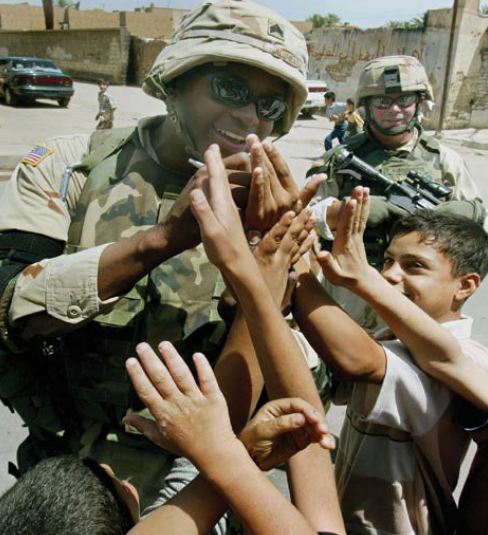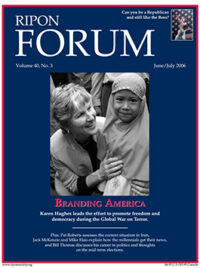“Demonstrate to the world that there is ‘No Better Friend,
No Worse Enemy’ than a U.S. Marine.”
These words by General James Mattis, issued to his Marines massed on the Iraq-Kuwait border prior to the invasion of 2003, uniquely captured the creed embraced by today’s U.S. fighting force.
Yet today on the world stage, particularly in Muslim nations, our military is too often viewed only as the enemy, a disturbing fact not lost on those who now wear the uniform. Make no mistake — death and violence are products of any war. But lost within today’s highly partisan environment are such deeply held goals as freedom and democracy. While policymakers and pundits attempt to score political points highlighting the former, today’s military is busily dedicated to securing the latter.
Make no mistake — death and violence are the products of any war. But lost within today’s highly partisan environment are such deeply held goals as freedom and democracy. While policymakers and pundits attempt to score political points highlighting the former, today’s military is busily dedicated to securing the latter.
Those who serve in the U.S. military do so for a number of reasons. Foremost among them is that individuals both past and present have had a desire to serve their nation and the democratic principals for which it stands. And despite the media’s almost exclusive focus on death and despair, those of us who have served know full well that a good day on the battlefield is one in which there are no casualties. Further, we see much of the human dignity that is recovered once tyranny is vanquished in the name of freedom – when citizens can vote for the first time, schools open for all children and businesses begin to thrive.
Yet, these are not the convictions or images conveyed by our own policymakers or the media to the world. As a result, an information void has been left from which the role of the U.S. military is too often projected as that of the aggressor versus that of the liberator.

Global opinion of the U.S. remains exceedingly poor, particularly among Muslims. With a worldwide Muslim population that is very young and growing rapidly, it is imperative that our nation articulate a clear vision that highlights our true intent of bringing liberty and restoring sovereignty for these citizens, while embracing their sincere cultural and religious beliefs. Otherwise, much of this huge demographic will remain isolated and vulnerable to fanatical rule, void of the civil liberties or economic infrastructures that provide new opportunities. While progress and political change do not occur in a vacuum, hatred often does. Aiding this dilemma is a media saturated world where car-bombs and body counts trump broader evidence of democratic reform and burgeoning political stability.
How can we more accurately portray the true role and character of the U.S. military to the world? First and foremost, the media can and should reassert their efforts to cover the Iraq War and other deployments from the perspective of those engaged – our Soldiers, Sailors, Airmen and Marines.
While countless journalists were embedded with U.S. military units during the initial invasion of Iraq, today such deployments are few and far between. In fact, the widely-praised embed program is almost non-existent – from 692 journalists embedded with coalition units during the invasion of Iraq compared to only 32 today, according to the U.S. Department of Defense. What is now portrayed as “on-the-ground” reports courtesy of the nightly news or printed in our daily papers is more often what we veterans call “balcony reporting.”
The U.S. military is the public face of America in many parts of the world, and how we interact with the people we meet has a real impact on how America is viewed. To the end, having a journalist on hand to cover these everyday interactions – whether it is a corporal playing soccer with a child on a dirt road on Kabul or a colonel sitting down with the Mayor in Tal Afar – would go a long way to conveying the true nature of America’s mission: that of a liberator, not a conqueror.
The purpose behind the embed program established prior to the 2003 invasion was for journalists to live, eat, sleep and patrol with a company or platoon-size unit for an extended period of time. In the process, reporters would get to know the soldiers personally and learn to evaluate the battlefield from their perspective – the good, the bad and the ugly. Such a unique vantage point gave journalists a sincere understanding of the decision making process in full view of the combat implications as they occur in real-time. Further, it gave them insights into the areas of operations and direct contact with the citizens of the regions.
Finally, it gave them an appreciation for the important role today’s military plays in promoting our country overseas. The U.S. Military is the public face of America in many parts of the world, and how we interact with the people we meet has a real impact on how America is viewed. To that end, having a journalist on hand to cover these everyday interactions – whether it is a corporal playing soccer with a child on a dirt road in Kabul or a colonel sitting down with the mayor in Tal Afar – would go a long way to conveying the true nature America’s mission: that of a liberator, not a conqueror.
It is true that some dedicated journalists still feel it imperative to journey out with those deployed in combat zones to see what they see, hear what they hear, and live through what they must live through. Some have paid the same price through death and wounds that so many of our colleagues in combat also have paid. NBC’s David Bloom, Atlantic Monthly’s Michael Kelly and ABC’s Bob Woodruff come most readily to mind. Such committed professionals, both past and present, should be commended and honored.
With increasing regularity, however, some in the media now stationed with U.S. troops position themselves in secure bases established outside of hot zones and attempt to interview troops not in the field, but only as they return from missions. Countless grunts have spoken openly about this “vulture syndrome” as they describe it, noting how reporters now largely go from one returning patrol to another hoping to find a unit that had recently been engaged in combat. If there was violence, there is interest. Anything positive or anything outside of deaths, however, is often of little use and thus not reported.
Otherwise, hosts of policymakers and the media appear more generally intent on a hindsight review of past military actions and decisions as opposed to covering more current and pressing events. It is almost as if they have given up on the mission in Iraq, and are now merely penning its obituary. There seems to be an almost wholesale dismissal by many policymakers and the media of anything positive about U.S. military missions, the situation on the ground or our global security strategy.
The resulting domestic political climate has become so toxic that partisans seemingly identify the enemy as those who sit on the other side of the aisle. This insular attitude is not only shameful, but reckless, jeopardizing the long-term security of our nation and undercutting our leadership in the world. Sadly, the resulting perceptions held by those outside our borders are often placed upon the shoulders of our men and women in the military.
Not until our own political leaders engage in debates over U.S. military strategy in a responsible, non-partisan manner, and the media provides a broader perspective of the Global War on Terror, will the rest of the world more fully understand and appreciate the role today’s men and women in uniform play in defending America and promoting freedom and democracy around the globe.
Wade Zirkle is founder of Vets for Freedom (www.vetsforfreedom.org). He served two deployments as a U.S. Marine in Iraq before being wounded in action. He plans to return to Iraq this summer to report from the frontlines.




